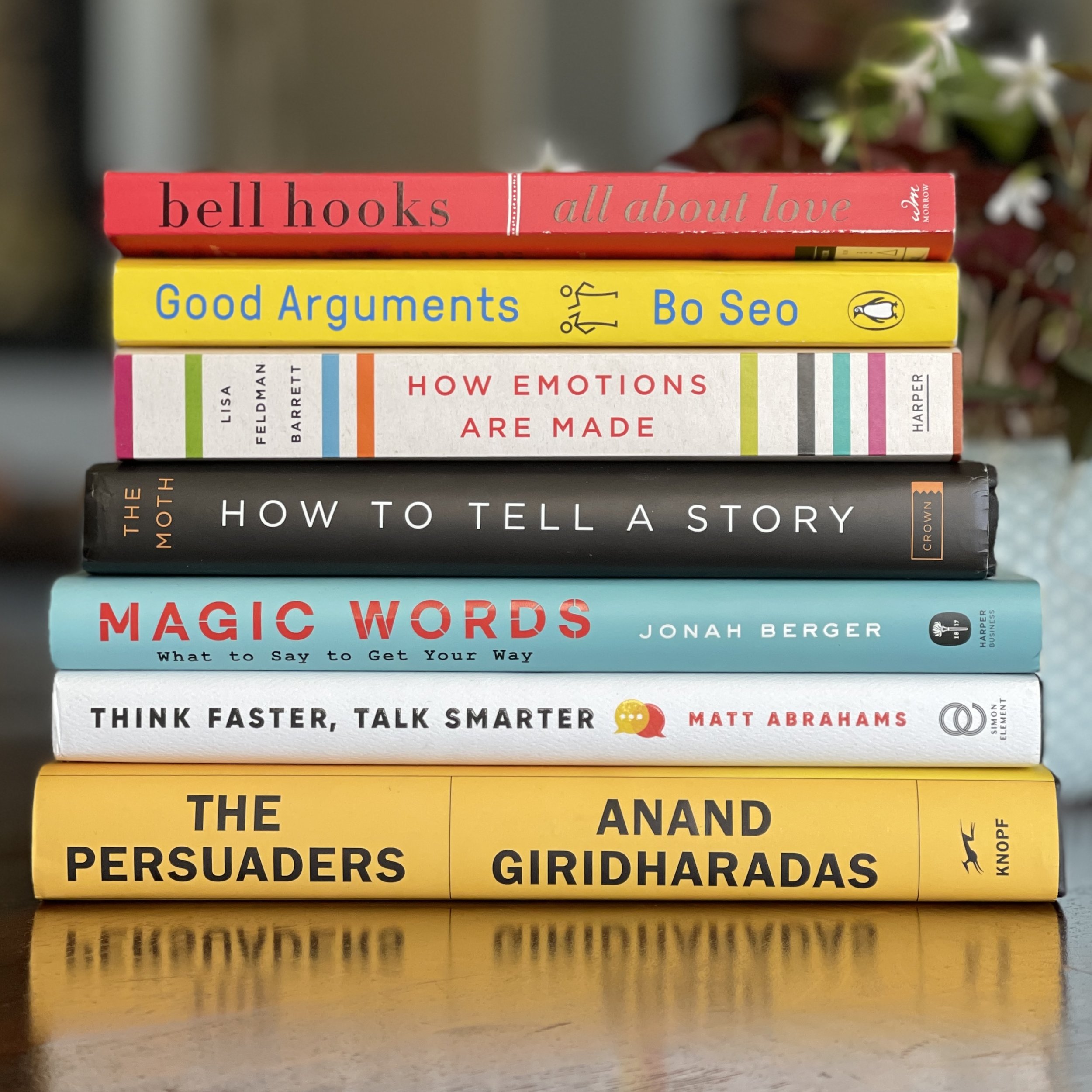7 Books to Advance Your Communication Skills
Effective communication is more crucial than ever. If you’re looking to advance your communication practice in 2024, we recommend you to read one of these books. Each offers a unique perspective on communication!
From bell hooks' exploration of love and empathy to Bo Seo's strategies in argumentation, to the complex nature of emotions as explained by Lisa Feldman Barrett, or mastering the art of storytelling from The Moth - these works collectively form a comprehensive guide for anyone looking to enhance their communication skills at home, work, and the community.
"All About Love: New Visions" by bell hooks
"All About Love: New Visions" is a significant read for anyone aiming to deepen their understanding of love and communication. hooks delves into the complexities of love, influenced by societal norms and gender roles. She defines love as "the will to extend one's self for the purpose of nurturing one's own or another's spiritual growth," highlighting that love is both a choice and an act of will.
This book is invaluable for those interested in enhancing communication skills, offering insights on:
The Role of Honesty in Communication: hooks emphasizes the importance of truthfulness in love and communication, noting the common practice of creating a false self and the need to break through this for honest communication.
Impact of Societal Norms: It provides a critical analysis of how societal expectations, especially around gender, affect our communication and understanding of love.
Empathy and Understanding: By exploring love through personal stories and cultural analysis, the book broadens perspectives, enhancing empathy in communication.
"Good Arguments: How Debate Teaches Us to Listen and Be Heard" by Bo Seo
Bo Seo, a two-time debating world champion, shares insights on engaging in tough conversations. The book is structured into four main chapters:
Essence of Argumentation: Discusses argumentation as a crucial skill for serious discourse, focusing on truth-finding and positive impact.
Structure of Arguments: Highlights the importance of a clear thesis, supporting evidence, and effective counter-arguments.
Psychology of Arguments: Explores how people respond to arguments, the role of emotions, and rhetorical strategies.
The Art of Listening: Emphasizes listening as a critical component of argumentation.
This book is a valuable resource for anyone looking to enhance their argumentation and communication skills.
"How Emotions Are Made" by Lisa Feldman Barrett
Lisa Feldman Barrett offers a new perspective on emotions. Barrett argues that emotions are not universally experienced but are constructed by the brain, influenced by past experiences, stimuli, and learned concepts.
For enhancing communication skills, the book provides:
Enhanced Emotional Intelligence: Insights into the constructed nature of emotions lead to improved emotional intelligence.
Empathy and Cultural Sensitivity: Understanding that emotions vary by culture and language fosters empathy in communication.
Management of Emotional Responses: Knowledge of how emotions are formed helps in managing emotional responses in communication.
"How to Tell a Story: The Essential Guide to Memorable Storytelling from The Moth"
This book emphasizes the transformative power of storytelling, both for the storyteller and the audience. It offers practical tips and examples for effective storytelling, highlighting its importance in pitching ideas or oneself.
Key aspects for communication skills enhancement include:
Techniques for Effective Storytelling: The book provides methods for crafting and delivering compelling stories.
Emotional Connection: It teaches how to use stories to create emotional bonds with audiences.
Building Confidence: Mastering storytelling can boost confidence in various communication settings.
This book explores the power of specific words in influencing behavior. Berger identifies seven magic words:
"Because": Builds trust and compliance.
"Free": Motivates action.
"Guarantee": Enhances trust and decision-making.
"New": Captures attention.
"Now": Creates urgency.
"Science": Adds credibility.
"You": Personalizes and connects.
This book is beneficial for anyone seeking to use language strategically in communication.
"Think Faster, Talk Smarter: How to Speak Successfully When Put on the Spot" by Matt Abrahams
Matt Abrahams' book focuses on spontaneous communication, particularly in unplanned speaking situations. It emphasizes shifting focus from self to audience, prioritizing connection over perfection, and tailoring messages to audience needs. Key techniques include developing an Anxiety Management Plan and utilizing structures like “problem, solution, benefit.”
Abrahams also discusses mindset changes to reduce anxiety and improve communication, such as striving for mediocrity and being present and responsive.
"The Persuaders" explores the art of persuasion in today’s society. Giridharadas shares stories of individuals like a leader of Black Lives Matter and a feminist in male-dominated spaces, who use persuasion effectively to bridge societal gaps.
The book is beneficial for enhancing communication skills, as it:
Expands Understanding of Persuasion: Offers deep insights into persuasion in complex societies.
Encourages Empathy and Inclusivity: Highlights the importance of understanding diverse perspectives.
Provides Real-World Examples: Includes practical examples of effective persuasion in various contexts.
Final thought: these six books provide a rich tapestry of knowledge and strategies for anyone seeking to improve their communication skills. From understanding the nuanced dynamics of love and societal norms to mastering the art of persuasion and spontaneous speaking, each book offers unique insights into the complex world of human interaction. Whether you're a professional looking to enhance your persuasive abilities, or simply someone aiming to communicate more effectively in your personal life, these books are great reads and even greater resources. By integrating the wisdom from these diverse perspectives, you can develop a more rounded and effective approach to communication, essential in navigating the challenges and opportunities of our interconnected world.

